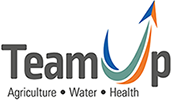TeamUp Uganda is financed by the German Federal Ministry for Economic Cooperation and Development (BMZ) and three leading German private foundations: Deutsche Stiftung Weltbevölkerung (DSW), Hanns R. Neumann Stiftung (HRNS) and Siemens Stiftung.
Public and private funding is combined into a joint approach with a framework of implementing partners in Uganda and donors in Germany. The aim of the donors is to increase efficiency in development cooperation and to enable better results by combining different areas of expertise in a joint approach.
Coordination and implementation is happening in close and regular exchange between the German and Ugandan counterparts.
 German Federal Ministry for Economic Cooperation and Development (BMZ):
German Federal Ministry for Economic Cooperation and Development (BMZ):
The United Nations 2030 Agenda for Sustainable Development forms the international framework of German development policy. The 2030 Agenda explicitly points out the importance of philanthropic organizations in order to reach global sustainability goals together with other actors. For this reason, BMZ has been intensifying its cooperation with German private foundations and philanthropists for several years. TEAM UP goes on an initiative of Federal Minister Dr. Gerd Müller. BMZ has accompanied and supported the design of the initiative and is contributing 50 percent of its funding. A close exchange of experience with the German Embassy in Kampala and state development cooperation with Uganda has been agreed.
 Deutsche Stiftung Weltbevölkerung (DSW):
Deutsche Stiftung Weltbevölkerung (DSW):
DSW is a global development organization that focuses on the needs and potential of the largest youth generation in history. We are committed to creating demand for and access to health information, services, supplies, and economic empowerment for youth. Within the TeamUp initiative, DSW empowers young people to make informed decisions about their sexual and reproductive health and rights (SRHR). It facilitates a framework of youth clubs whose members actively advocate for the use of contraceptives, menstrual hygiene in schools, equal rights for both genders and protection against HIV. Peer-educators who received additional training in presentation and leadership pass on their knowledge to peers, cascading information and instilling lasting change. DSW works closely with its local partner Action for Health Uganda (A4HU) that emerged in 2017 as an independent non-governmental organization from the DSW country office in Uganda.
 Hanns R. Neumann Stiftung (HRNS):
Hanns R. Neumann Stiftung (HRNS):
The goal of HRNS is to improve the living and working conditions of smallholder families in coffee producing countries. One of the foundation’s missions is to help young people in Mityana, where around 80 percent of the population work in agriculture, and to improve their economic situation. By providing agricultural, financial and entrepreneurial skills through HRNS Uganda, young people should be empowered to make informed decisions about making a living. Improved access to markets, resources, such as land, as well as financial services should help them to increase their income de facto. The Village Savings and Loan Association (VSLA) is also designed to give those who are unable to meet the requirements of official financial institutions the opportunity to obtain access to credit within their communities. HRNS will use its network of Producer Organizations, Depot Committees and the Uganda Coffee Farmers Alliance to represent the interests of youth at the country level as part of a national community of coffee growers.
 Siemens Stiftung:
Siemens Stiftung:
The goal of Siemens Stiftung is to contribute to the improvement of living conditions in developing regions by promoting innovations and proven models in technology and social entrepreneurship as well as to create perspectives in local communities. As part of the TeamUp initiative, among other things, Siemens Stiftung will support the development of an innovative approach to water maintenance. In addition, further joint approaches to entrepreneurship and income generation for young people will be developed. The Siemens Stiftung draws on its expertise and network in the areas of water and hygiene, technology, and social entrepreneurship. The local implementation partner for the program areas of water system maintenance is the Ugandan social enterprise Whave Solutions. Whave works to establish structures for public private partnerships (PPP) in collaboration with local government and rural communities. By training young people to become water-system technicians and by setting up local water service providers, the organization will create a solution to provide long-term, reliable access to water in remote regions.
